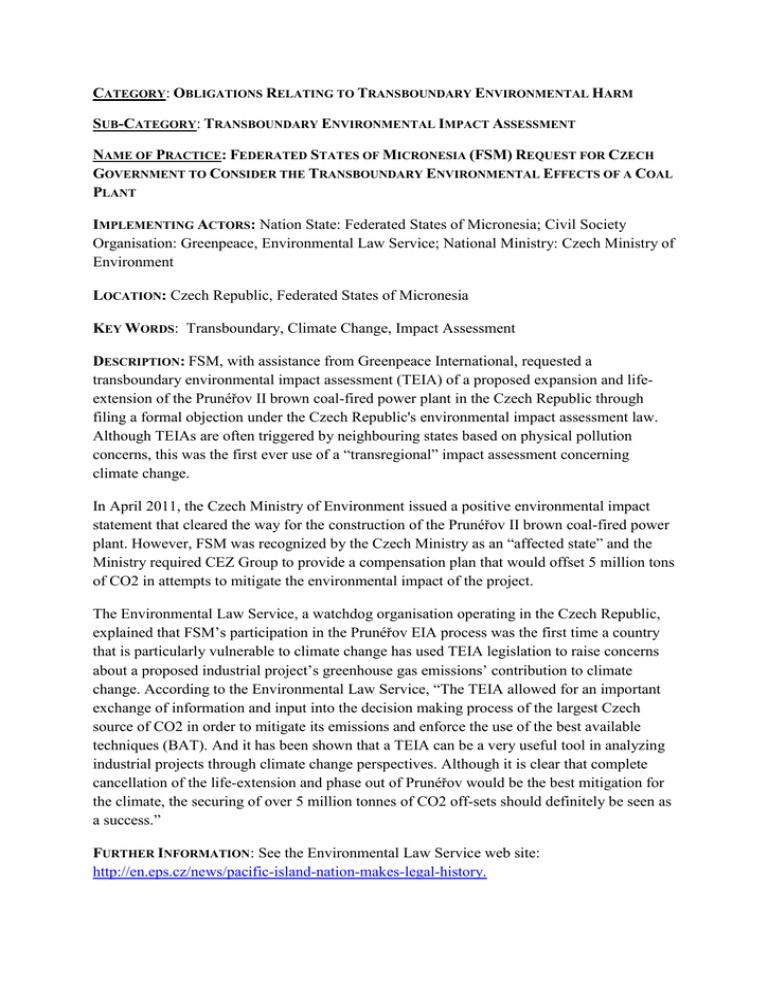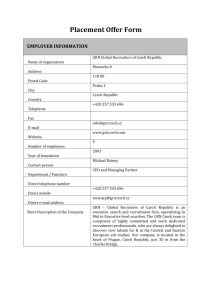C O R T
advertisement

CATEGORY: OBLIGATIONS RELATING TO TRANSBOUNDARY ENVIRONMENTAL HARM SUB-CATEGORY: TRANSBOUNDARY ENVIRONMENTAL IMPACT ASSESSMENT NAME OF PRACTICE: FEDERATED STATES OF MICRONESIA (FSM) REQUEST FOR CZECH GOVERNMENT TO CONSIDER THE TRANSBOUNDARY ENVIRONMENTAL EFFECTS OF A COAL PLANT IMPLEMENTING ACTORS: Nation State: Federated States of Micronesia; Civil Society Organisation: Greenpeace, Environmental Law Service; National Ministry: Czech Ministry of Environment LOCATION: Czech Republic, Federated States of Micronesia KEY WORDS: Transboundary, Climate Change, Impact Assessment DESCRIPTION: FSM, with assistance from Greenpeace International, requested a transboundary environmental impact assessment (TEIA) of a proposed expansion and lifeextension of the Prunéřov II brown coal-fired power plant in the Czech Republic through filing a formal objection under the Czech Republic's environmental impact assessment law. Although TEIAs are often triggered by neighbouring states based on physical pollution concerns, this was the first ever use of a “transregional” impact assessment concerning climate change. In April 2011, the Czech Ministry of Environment issued a positive environmental impact statement that cleared the way for the construction of the Prunéřov II brown coal-fired power plant. However, FSM was recognized by the Czech Ministry as an “affected state” and the Ministry required CEZ Group to provide a compensation plan that would offset 5 million tons of CO2 in attempts to mitigate the environmental impact of the project. The Environmental Law Service, a watchdog organisation operating in the Czech Republic, explained that FSM’s participation in the Prunéřov EIA process was the first time a country that is particularly vulnerable to climate change has used TEIA legislation to raise concerns about a proposed industrial project’s greenhouse gas emissions’ contribution to climate change. According to the Environmental Law Service, “The TEIA allowed for an important exchange of information and input into the decision making process of the largest Czech source of CO2 in order to mitigate its emissions and enforce the use of the best available techniques (BAT). And it has been shown that a TEIA can be a very useful tool in analyzing industrial projects through climate change perspectives. Although it is clear that complete cancellation of the life-extension and phase out of Prunéřov would be the best mitigation for the climate, the securing of over 5 million tonnes of CO2 off-sets should definitely be seen as a success.” FURTHER INFORMATION: See the Environmental Law Service web site: http://en.eps.cz/news/pacific-island-nation-makes-legal-history.



